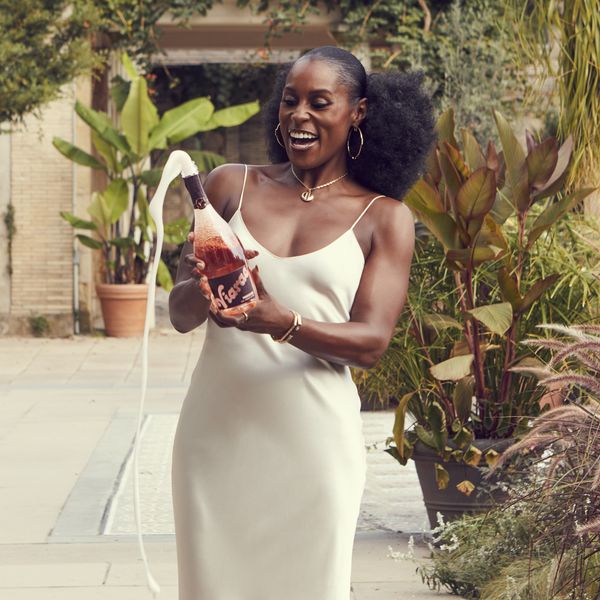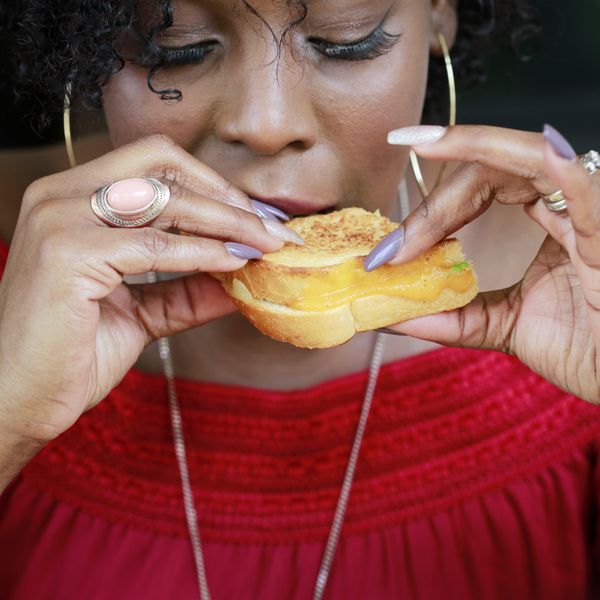
I'm pretty sure that everyone reading this knows that protein is essential to their overall health and well-being. But have you ever wondered exactly why that is the case? Long story short, protein is a macronutrient that is found in every part of our body because it's a part of every cell. Protein helps to build and repair tissues in our system while also being what helps to make enzymes, hormones, muscle bones and more. Our hair? It's mostly protein. Our nails? They are mostly protein too. Bottom line, there's basically no way we can function properly without protein being a part of our daily diet.
And what has a lot of protein in it? Meat, hands down. Yet what do you do if you happen to be a vegetarian or vegan because, as a woman, you need around 46 grams of protein a day (56 grams if you're a man)? Good question. Luckily, there are several non-animal-related foods that can get you the protein that your body craves without you having to betray your personal eating preferences. As far as the ones that can get you the most protein possible, I've got a list of 12 of 'em right here.
1. Eggs
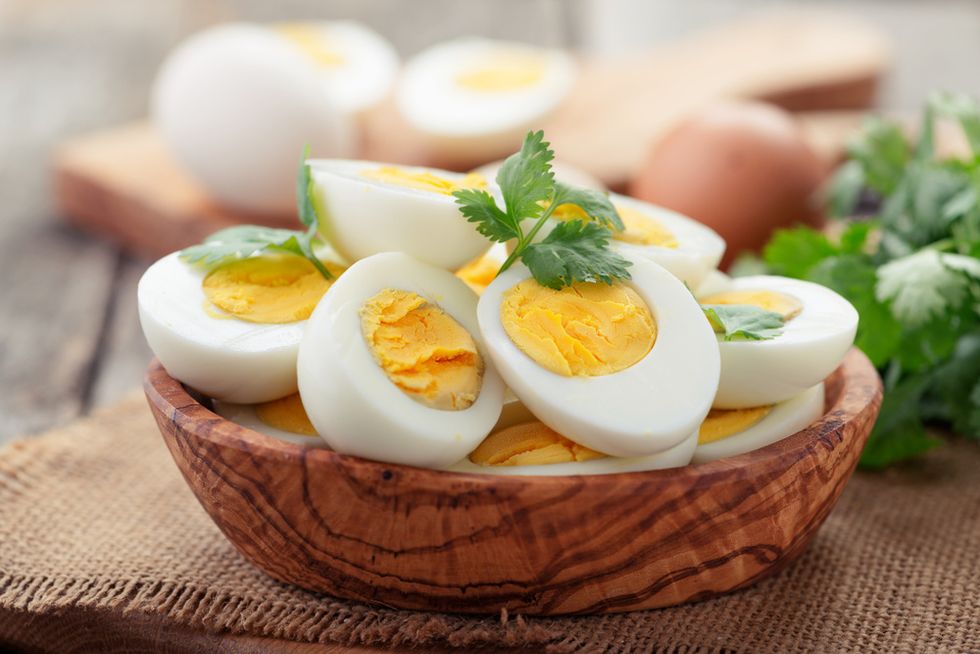
If you're a vegan, you'll need to pass on eggs because they are a dairy product. But if you're a vegetarian, technically you can eat them because they aren't considered to be what falls into the "animal flesh" category. As far as health benefits go, eggs are high in selenium and riboflavin (Vitamin B2), along with having a good amount of vitamins A and E, folate, calcium and zinc in them. Eggs also contain choline (which helps to build healthy cell membranes), they help to produce "good cholesterol" that can lower heart disease and they have the antioxidants lutein and zeaxanthin in them to help with keeping your vision in peak condition.
Eggs are also dope on the protein tip because one egg contains about six grams of it. Another great thing about eggs is they contain amino acids; ones that your system is able to turn into protein once you consume them.
2. Greek Yogurt
This is another heads up for vegetarians only because Greek yogurt is also a dairy product. If you've ever wondered what makes Greek yogurt different from all of the rest, it's because the whey that is in other yogurts is removed from it. As a result, Greek yogurt doesn't contain any lactose (a sugar that is found in milk). When it comes to Greek yogurt's benefits, it's got calcium, probiotics and Vitamin B12. The combination makes this particular food great for maintaining bone health, boosting metabolism, improving gut health, lowering blood pressure and even helping to treat depression.
And just how much protein is in this kind of yogurt? Oh, it's got a lot! If you eat one container of it, you'll be giving your system somewhere between 14-17 grams of protein. Whew!
3. Sun-Dried Tomatoes
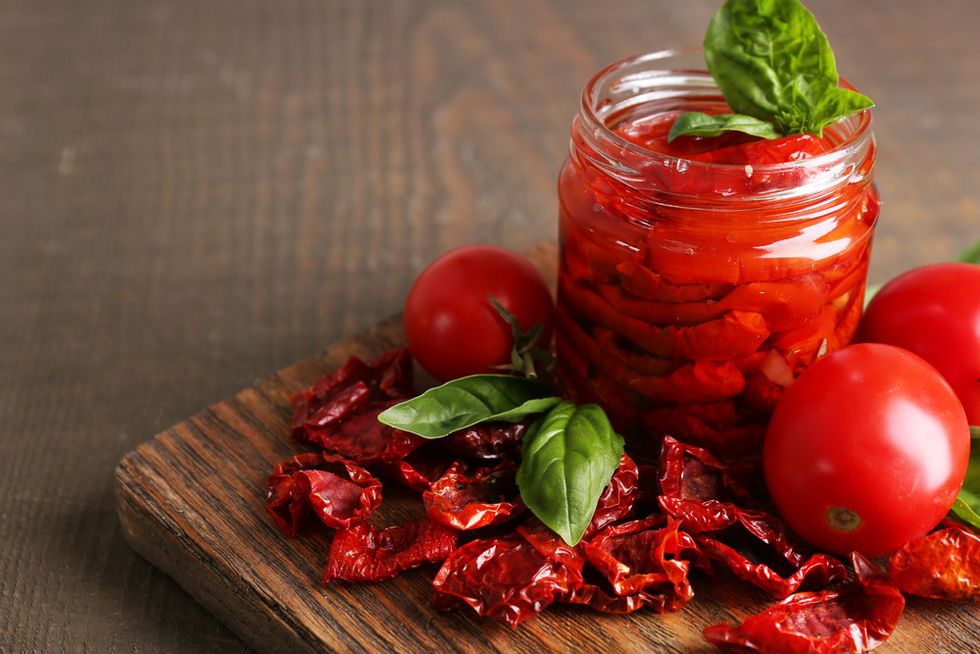
If you keep tomatoes in your refrigerator, they are able to last anywhere from 10-14 days. But if you want to be able to enjoy them longer, one thing you can do is let them dry out in the sun or oven (you can learn how to go the oven route here). Considering this as an alternative is good because tomatoes are full of fiber, iron, magnesium, phosphorus, several forms of Vitamin B and also vitamins C and K. Tomatoes are also a great source of antioxidants which makes them a great fruit to fight off free radicals, reduce bodily inflammation, improve your digestive health and, even boost collagen levels so that your skin looks younger for longer.
When it comes to protein consumption, it doesn't get much better than tomatoes. The reason why I say that is because you can get as much as eight grams of protein for every cup of them that you eat. So, if you put a few of these on a salad, you will have a lot of the protein intake that you need for any particular day.
4. Broccoli
Broccoli is a great source of all kinds of goodness. It's full of vitamins A, C, E, K and iron, calcium, potassium, folic acid and magnesium. So, no wonder broccoli is the kind of veggie that is able to support strong bones, reduce the risk of heart disease and keep your eyes in great shape (thanks to the carotenoids lutein and zeaxanthin that are also in them). As a bonus, broccoli even contains cancer-fighting compounds.
As if all of that wasn't impressive enough, something else that broccoli's got plenty of is protein. As much as five grams per serving (which is a cup). Just make sure that you steam it if you want to get the most out of it. Preparing broccoli any other way can zap some of its nutrients.
5. Oats
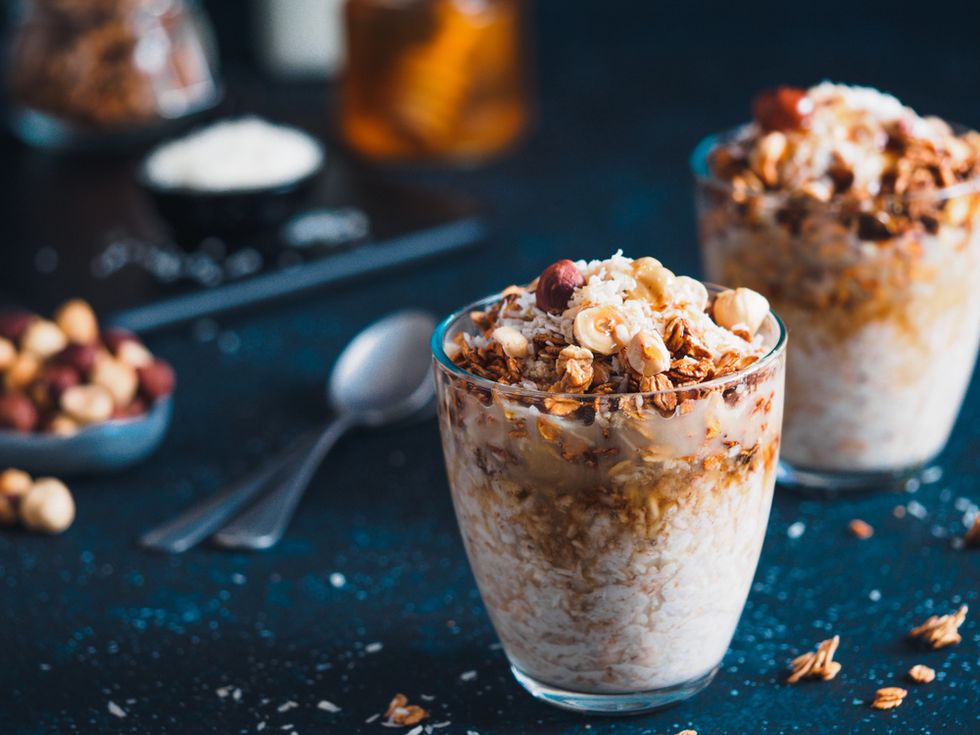
If you're someone who has a heaping bowl of oatmeal, at least a couple of times a week, good for you. Oats contain a massive amount of manganese (191 percent of the reference daily intake), along with a high amount of phosphorus, magnesium, copper, fiber, thiamin (Vitamin B1) and some iron and zinc too. Oats will also do your body good because they've got the antioxidants avenanthramides that can lower your blood pressure, improve your blood sugar levels, reduce your colon cancer risk, strengthen your immune system and, because it's high in good carbs, oats can give you a good boost of energy too.
Oats are a good way to get more protein. If you have a half-cup of 'em, you'll get someone around 13 grams. Impressive.
6. Lima Beans
Is it just me or are lima beans a super acquired taste? Either way, in just a sec, I'm gonna blow your mind with how much protein is in this particular vegetable. But first, its other health benefits. As far as vitamins and minerals go, lima beans can get you a good amount of manganese, copper, potassium, phosphorus, iron and folate. These are the kind of beans that can help to lower your blood sugar and cholesterol levels, support your nervous system and, thanks to the fiber that's also in them, lima beans can help to keep you regular while detoxifying your system too.
But here's the real clincher. Guess how much protein is in a half-cup of lima beans? 21 freakin' grams! Yep, that's the most out of any other food on this list and, if you eat a cup of 'em, you've pretty much taken in all of the protein that your body needs for the day. No wonder grandma used to make us eat them so often, huh?
7. Guava
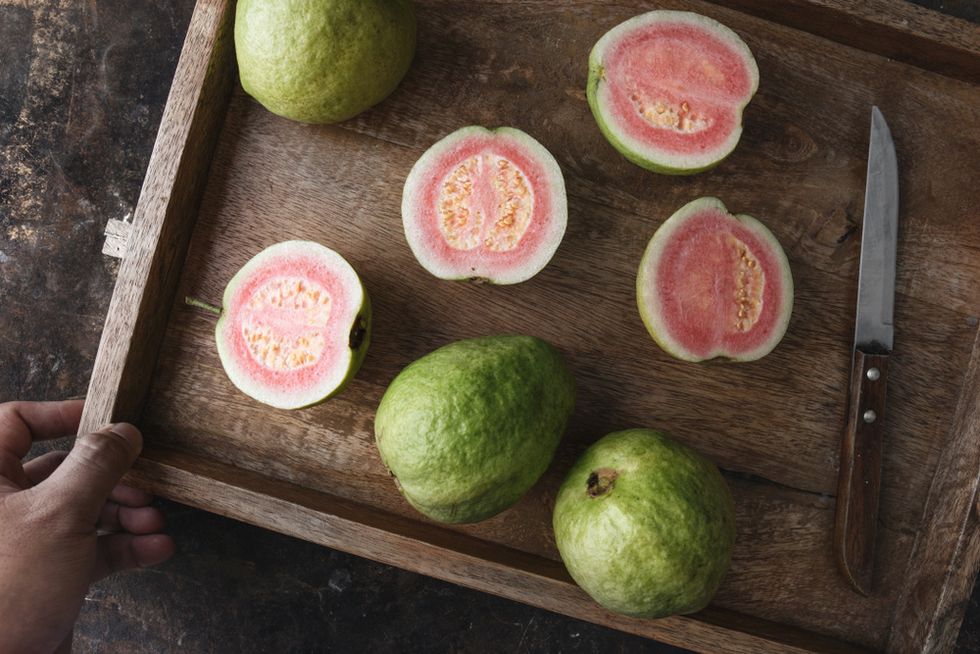
Unlike a lot of fruits that are in their peak during any other season but winter, guava is the opposite. It is at its best between November and April. Guava is a tropical fruit that's really good for you because it's high in Vitamin C, potassium and fiber. It is able to help to lower your blood sugar levels, improve your heart health, boost your digestive health, strengthen your immunity and even lessen the pain of period cramps (how cool is that?).
One of the best things about guava, though, is it's pretty off the charts when it comes to being a wonderful source of protein. While it's a pretty low-calorie fruit (somewhere around 120 calories per cup), you're able to get yourself 4 ½ grams of protein per cup too.
8. Potatoes
Ah, potatoes. Now this is the kind of food that sometimes I've gotta talk myself out of eating (because everything must be done in moderation, right?). I don't know what it is exactly, but whether it's a French fry or a baked one (white or sweet; it doesn't really matter), potatoes just feel so damn comforting. Plus, there are several things that make them good for us. Potatoes are a great source of vitamins B6 and C. Potatoes have a ton of potassium in them (a potato contains more potassium than a banana does). Believe it or not, potatoes are also fat, sodium and cholesterol-free. Added benefits include the fact that potatoes have no gluten in them, can help to fight off free radicals and even has studies stating that they can hinder the growth of liver and colon cancer cells.
Also, no matter how you prefer to prepare your potato, you can get a nice amount of protein from it. In fact, a medium-sized potato will give you around four grams of protein. Dope.
9. Coconut
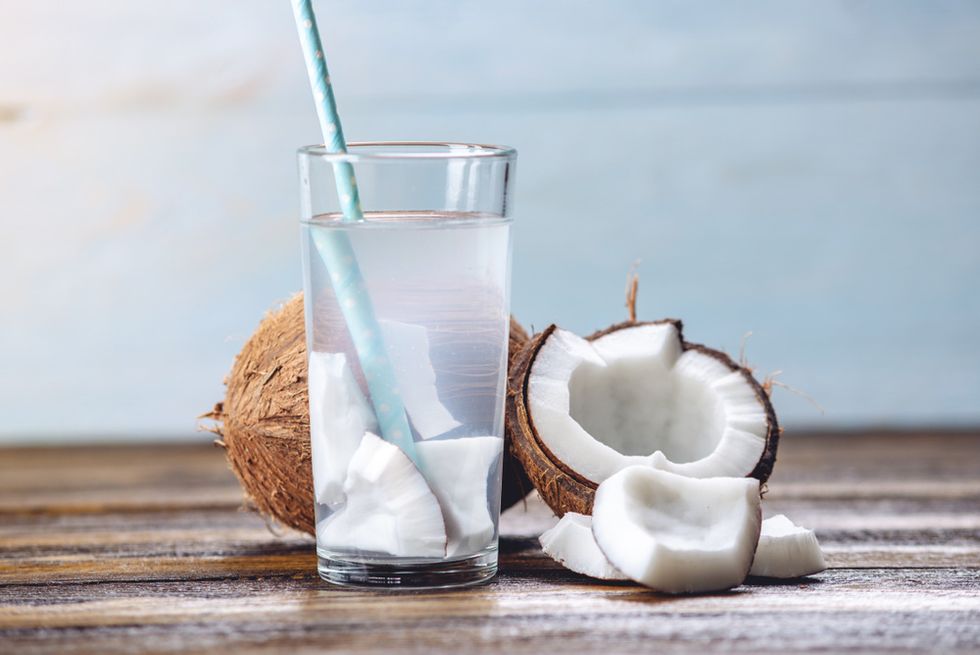
Coconut, taste wise, is something that is difficult to describe, I won't lie. Personally, I like coconut milk and even dried coconut. It's a food that's considered to be a fruit, nut and seed that contains healthy fats, is high in electrolytes (to keep you hydrated), contains lauric acid (which can fight bacteria in your system), and it has antifungal and antibacterial properties that will fight oral decay and help to prevent bladder infection, kidney disease, thyroid dysfunction and skin and scalp infections too.
Coconut is another food that makes the high-in-protein list because, if you eat a medium-sized coconut, you're actually getting somewhere around 13 grams of protein; that's close to one-third of the daily recommended amount that your system needs.
10. Hemp Seeds
OK, so let me say off top that, although these seeds have the word "hemp" in them, don't let that get you all excited. Hemp seeds are seeds that come from the Cannabis sativa plant and they don't produce any sort of mind-altering effect. Still, if you add these into your diet, they can benefit your health in a myriad of ways. Hemp seeds are a great source of alpha-linolenic acid (which is an omega-3 fatty acid), many forms of Vitamin B, Vitamin E, magnesium, potassium and folate. Eating hemp seeds will help to reduce bodily inflammation, boost heart health, heal acne, reduce symptoms related to rheumatoid arthritis and, they can help to protect your brain as well.
Hemp seeds are really impressive when it comes to how much protein that you can get out of them. You can actually get close to 10 grams of protein if you consume as little as three tablespoons of them. And, since hemp seeds contain all nine essential amino acids, they are the kind of seeds that are on the list of being a superfood too.
11. Green Peas
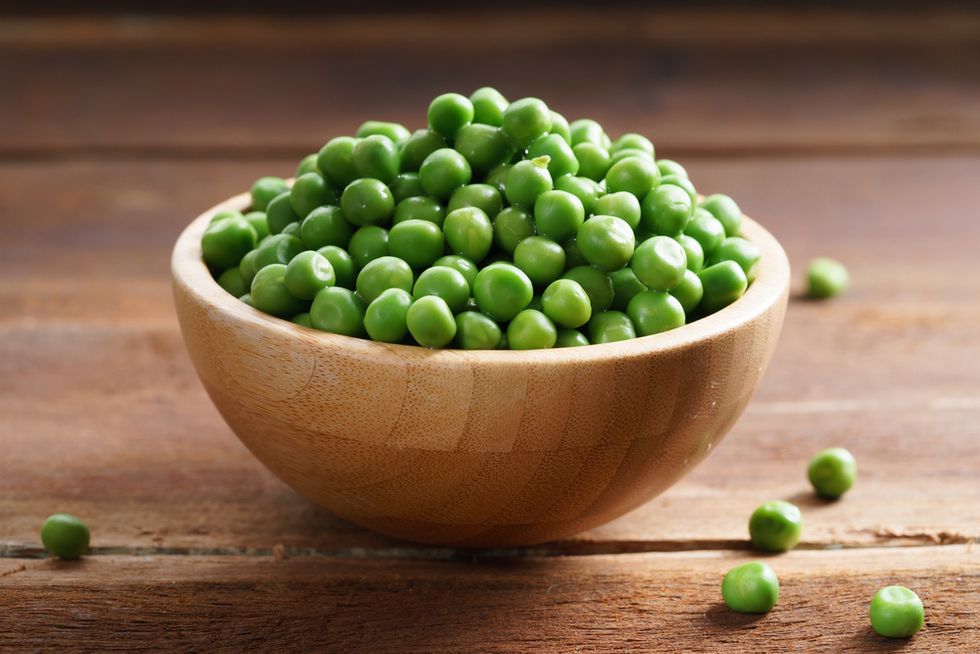
Green peas are something that I can get down with. Like carrots, they're a semi-sweet veggie. They've got an impressive amount of vitamins A and K as well as folate, fiber, calcium and manganese that work together to do things for your health like helping to protect you from getting heart disease and controlling your blood sugar.
And yes, they are another vegetable that is a good protein source. How much? Well, a half-cup can get you somewhere around four grams which is actually three times more than what a half-cup of carrots will provide.
12. Sprouted Bread
If you've got a craving for a sandwich, don't deprive yourself. Just be intentional to make it out of sprouted bread. What's that? It's bread that has been made from whole grains that have germinated. Sprouted bread is beneficial because, since its grains have literally sprouted, you are able to get more nutritional value when it comes to vitamins B and C and fiber with each slice. Sprouted bread also contains the enzymes phytase and amylase which makes it easier to digest, is lower in gluten and has higher antioxidant levels in it (like beta-carotene) to protect your system from free radicals.
If you opt for eating a sprouted bread brand like Ezekiel Bread, the millet, barley and beans that are in it will give you as much as three grams of protein a slice; that's pretty impressive if you're looking for just one more non-meat way to get your daily protein fix. So, what are you waiting for? Eat up, sis!
Join our xoTribe, an exclusive community dedicated to YOU and your stories and all things xoNecole. Be a part of a growing community of women from all over the world who come together to uplift, inspire, and inform each other on all things related to the glow up.
Featured image by Shutterstock
- 15 best plant-based protein foods ›
- Complete Proteins: 10 Sources for Vegans and Vegetarians ›
- Best Vegetarian and Vegan Protein Sources | Health.com ›
- The best vegan protein sources | BBC Good Food ›
- 26 Best Vegetarian Protein Foods to Lose Weight and Build Muscle ›
- 13 Nearly Complete Protein Sources for Vegetarians and Vegans ›
- The 17 Best Protein Sources For Vegans and Vegetarians ›
This Is How To Keep 'Holiday Season Stress' From Infecting Your Relationship
Hmph. Maybe it’s just me, but it seems like there is something really weird happening in the fall season air (because winter doesn’t officially begin until December 21) that cuddle season is in full swing while break-up season is as well. In fact, did you know that break-ups are so popular during the holiday season that December 11 is deemed Break-Up Day?
The reasons why relationships shift around this time vary; however, I did both roll my eyes and chuckle when I read that a very popular one is because it’s an easy way to get out of getting one’s significant other a Christmas present. SMDH.
Anyway, I personally think that the less shallow folks out here may contemplate calling things “quits” or they at least distance themselves a bit from their partner (and what I’m referring to is serious relationships) due to all of the stress and strain that oftentimes comes with the holidays whether it be financial, familial, due to their tight schedules or something else.
Listen, I would hate for you and your man to miss the fun and happiness of experiencing this time of year, all because you are so overwhelmed or irritated that you can’t really enjoy it. That’s why I have a few practical tips for how to avoid allowing the typical holiday season stress from INFECTING your relationship.
Manage Your Expectations
 Giphy
Giphy
Unmanaged expectations. If there is a main reason why the holiday season tends to be so stress-filled for so many people, I’d bet good money that this is the cause. And when you’re in a long-term relationship, expectations can manifest themselves in all sorts of cryptic and/or unexpected ways. You might have relatives who assume that you are going to be with them for Thanksgiving or Christmas when you have other plans in mind. You might be thinking that you are going to spend one amount for presents while your man is thinking something totally different. When it comes to scheduling, your signals may be crossed.
And you know what? To all of these scenarios, this is where clear and consistent communication come in. Don’t assume anything. Don’t dictate anything either. From now until New Year’s, mutually decide to check in once a week, just to make sure that you are both on the same page as it relates to the holidays and what you both are thinking will come along with it. The less blindsided you both feel, the less stressed out you will be. Trust me on this.
Set (and Keep) a Budget
 Giphy
Giphy
Okay, so I read that last year, 36 percent of Americans incurred some type of holiday-related debt. Hmph. Last year, there was still some sense of normalcy in this country, chile, so I can only imagine what finances are gonna look like over the next several weeks. That said, since I don’t know a lot of people who don’t find being broke stressful, make sure that you and your bae set a budget and then stick to it this year — no ifs, ands or buts.
Because really, y’all — it doesn’t make sense to deplete savings and/or max out credit cards for a few days of giggles only to be damn near losing your mind because you don’t know how to make ends meet come Dr. Martin Luther King, Jr. Day.
And by the way, this tip doesn’t just speak to things like food and gifts; I also mean travel. If it doesn’t make a ton of sense (or cents) to be all over the place this year — DON’T BE.
Keep Matthew 5:37 at the Forefront
 Giphy
Giphy
If off the top of your head, you don’t know what Matthew 5:37 says, no worries, here ya go: “But let your ‘Yes’ be ‘Yes,’ and your ‘No,’ ‘No.’ For whatever is more than these is from the evil one.” That verse right there? Oh, it’s a boundaries lifesaver! I say that because do you see “maybe” or “I’ll think about it” in there? Nope. LOL. It says that you should tell people “yes” or “no” and leave it at that — and that complements Anne Lamott’s quote, “’No’ is a complete sentence” impeccably well. Yeah, you’ve got to remember that anything beyond a yes or no to a request is privileged information; you don’t owe anyone details or an explanation.
Besides, if you are really honest with yourself, when someone asks you something and you give a “Umm, let me think about it” kind of reply, more times than not, you already know what your answer is going to be — so why not let you both off of the hook? Give your response. Commit to that. And let everyone (including yourself) get on with their lives and schedules.
I promise you that when it comes to those holiday parties, you are pissing more folks off by not RSVP’ing or doing so and not showing up than just saying, “Thank you but not this year” off the rip.
Remember That Your Personal Space Is Privilege Not a Right
 Giphy
Giphy
A friend of mine recently bought a new house and invited me over to come see it. He’s a single man with no children, so as I was taking in all of the space that he had, especially as I walked through his finished basement, I joked about relatives coming to live with him. “Hell no” and “absolutely not” were pretty much his immediate responses as he went on to say that some folks even had the nerve to be offended when he told them that he had no intentions on taking DNA in.
Ain’t it wild how people think that your stuff is their right? And yes, that brings me to my next point. Your home is your sanctuary space. If you want to host folks this year — cool. If not, ALSO COOL. Please don’t let folks (family included) guilt you into how they want you to act or even into what they would do if the shoe was on the other foot. You are not them — and as one of my favorite quotes states, “If two people were exactly alike, one of them would be unnecessary.” (A man by the name Larry Dixon said that.)
Hell, my friends? They know that I am good for sending them random things that they need or even want all throughout the year. Coming over to hang out at my pace, though. Uh-uh. Chalk it up to being a card-carrying member of the ambivert club yet I like keeping my living space personal — and I sleep like a baby, each and every night, for feeling that way.
Always remember that your space, your time, your resources, your energy and shoot, yourself period (including your relationship), are all things that are your own. You get to choose how, when and why you want to share them. The holiday season is certainly no exception.
Cultivate Some “You Two Only” Traditions
 Giphy
Giphy
It’s not uncommon for some couples to hit me up after the holiday season to “detox.” Sometimes it’s due to the financial drama (and sometimes trauma) that they experienced. Sometimes it’s because they allowed their relatives (especially in-laws) to get more into their personal business than they should’ve. More than anything, though, it tends to be because they didn’t get enough quality time together and so ended up feeling “disconnected.”
Please don’t let that happen. Listen, I’m not even a holidays kind of woman and yet, I will absolutely sit myself down with some hot chocolate and chocolate chip cookies to enjoy a Hallmark holiday film or two. Aside from the fact that most of them are lighthearted and sweet, I also like that they usually focus on couples loving on each other amidst all of the holiday beauty and ambiance — which is something that all couples should set aside some time to do.
Maybe it’s a vacation. Maybe it’s a staycation. Or maybe it’s my personal favorite, A SEXCATION. Whether it’s for a few days, the weekend or even overnight — don’t you let the holidays go by without setting aside time for you and your man to celebrate one another. Don’t you dare (check out “Are You Ready To Have Some Very Merry 'Christmas Sex'?”).
GET. SOME. REST.
 Giphy
Giphy
I once read that 8 out of 10 people get stressed out over the holidays and 3 out of 10 lose sleep during to it — and when you’re stress-filled and sleep-deprived, that can absolutely lead to hypersensitivity, making mountains out of molehills and even not being in the mood for sex.
Your relationship can’t afford to go through any of this, so definitely make sure to prioritize rest. I don’t care how unrealistic it might seem during this time, sleep should never be seen as a luxury; it will always and forever be a great necessity.
That said, try to get no less than six hours of shut-eye in (check out “6 Fascinating Ways Sex And Sleep Definitely Go Hand In Hand”) and even ask your bae to take a nap with you sometimes (check out “Wanna Have Some Next-Level Sex? Take A Nap, Sis.”). Not only will sleep help to restore your mind, body and spirit but, when it’s with your partner, it’s an act of intimacy that can make you both feel super connected, even in the midst of what might feel like chaos.
___
Holiday season stress is real. Still, never give it the permission or power to throw your relationship off. Put you and your man first and let the holidays be what they are gonna be, chile.
Let’s make things inbox official! Sign up for the xoNecole newsletter for love, wellness, career, and exclusive content delivered straight to your inbox.
Featured image by Shutterstock
'Constant Reassurance' Is The Relational Orange Flag No One Wants To Address
Read more than scroll. Boy, if there is a motto that I would encourage people to implement, now more than ever in their life, it would be how important it is to read (actual books, researched data and fact-based information) over merely scrolling via social media. Because boy — every time I look out on apps to see what folks are talking about, I don’t know if I’m impressed with or appalled by how many nothing-more-than-emotionalized opinions are so boldly stated when, after five minutes on Google, it’s clear that there are virtually zero facts to back them up.
Not to mention the fact that so many folks literally don’t read (you know, past skimming) anymore — and yes, I have stats to prove it. I recently read that back in 2022, reportedly, a little over 48 percent of people read one book over the course of that entire year (that is not a good thing and proves that book reading is on a steady decline). Meanwhile, the amount of time that is spent on social media: 2.5 hours on a daily basis. That’s 150 minutes of listening to folks just say…whatever. And if you listen to it long enough, you could actually start believing it as gospel.
This includes what I am going to touch on today: the belief that if someone really cares about you, they should constantly reassure you. Y’all damn near are gonna have me join the world of social media again, just to address this one fallacy. For now, though, I’ll settle for making some points via this article — because as you can see from the title, I don’t agree with that conclusion at all.
In fact, I personally believe that thinking this way is a pretty big relational orange — if not red — flag.
Reassurance. And What It Does for a Child.
 Giphy
Giphy
If you’ve read enough of my content, you know that I am big on word definitions — and when it comes to the word “reassurance,” the meaning alone explains why this article has the title that it does:
Reassurance: something, such as information, praise, or an action or gesture, that soothes, comforts, or restores to confidence
Reassurance restores confidence. Bookmark that, please. I will certainly circle back to that point before I am done.
Okay, so when it comes to, say a child, there is absolutely a place for reassurance. That’s because they are still in the process of significant self-development and so they need reassurance in order to feel safe, secure and loved. It’s also a way for them to establish trust in others.
However, did you know that many mental health experts say that if a child deals with, say anxiety, constant reassurance can actually be counterproductive because they can start to rely on external validation to emotionally stabilize them instead of learning how to remain calm and relaxed on their own (yeah, bookmark that too)? Some other ways that constant reassurance can become potentially problematic is it can cause kids to create problems that don’t exist, to overthink and to jump to the wrong conclusions (hmm…very interesting).
And so, already, we’re seeing something pretty interesting, right? Although reassurance has its place, too much of it, even for kids, typically ends up doing more harm than good.
Let’s keep building.
How 'Lack' As a Child Can Manifest As an Adult
 Giphy
Giphy
Okay, so we just touched on how constant reassurance can be counterproductive for an anxious child. Now what about when that child grows up? If they never learned how to properly and effectively deal with their anxiety, what then? Well, this is where attachment styles can very easily come into play — especially since one of them is literally called “anxious attachment style.”
Anxious attachment style is rooted in insecurity. It typically stems from experiencing the type of dysfunctional upbringing that resulted in one or both parents being unpredictable or inconsistent in their caregiving approach and techniques. As a result, the child deals with things like fear of abandonment or rejection and, without healing from that, they become an adult who is pretty much the exact same way.
In relationships, it can manifest in them being extra clingy, codependent, super jealous, controlling or — catch it — someone who is always looking for validation and reassurance.
Hmph. Did you catch that? Did you really catch that? Needing constant reassurance in a relationship IS NOT something that should automatically come with a relationship. In fact, if you’re someone who has this type of need or even expectation, there’s a really good chance that what you actually need is therapy — not for your partner to work harder to make you feel better about yourself or the relationship.
Which brings me to my next point.
Relationships Can Be Therapeutic. They Aren’t Therapy, Though.
 Giphy
Giphy
Something that some of my clients will tell you that they’ve heard me say, more than once I might add is, “PARENT and PARTNER are not palindromes.” A palindrome is a word (line, sentence, etc.) that is the same whether it is spelled backwards or forwards — and while, of course, parent and partner couldn’t qualify as being that, what I mean is there are far too many people who think that partners should pick up where parents left off and/or dropped the ball — and that is a super unhealthy approach to relationships. Come to think of it, not only is it unhealthy but really unfair as well.
This is exactly why I’m not big on phrases like “the princess treatment” in adult relationships. A princess is the daughter of a king while a queen is the wife of one. For a grown woman to expect a man to do what a father did for her as a child without accepting that as an adult, there are far more responsibilities as a wife that comes into play? Yep, that is toxic thinking.
And you know what? So is expecting your partner to overcompensate for where your father and/or mother didn’t show up in the way that they should have. That is not your partner’s fault, their role or their assignment while dating you. If you feel otherwise, it really is time to speak with a professional who can help you to do a bit of “reprogramming” in your thinking because, for you to feel and/or assume that since your parents didn’t make you feel confident and secure or teach you how to value yourself, your partner should work overtime to make up for it? There is not one thing that is healthy, mature or emotionally solid about having that type of mindset.
And that is why I am also good for saying that, although relationships can be therapeutic (healing), they should never EVER be seen as therapy. Therapists are trained to deal with the mental and emotional challenges that people have. On the other hand, no one should expect their partner to have the knowledge and expertise that professionals do — and while we’re here, partners also shouldn’t trust that someone who needs the assistance of a therapist to become whole (again) would know exactly what steps are required for that to happen.
So yeah, if you’re someone who thinks that being loved means that someone needs to constantly make you feel good about yourself or secure in the relationship — you probably do have an anxious attachment style. See a professional to get that confirmed, though. Because no one should have to make you feel valued or worthy. That is an inside job.
And this brings me to my final point.
It’s Not Fair to Want Someone to Love You More than You Do
 Giphy
Giphy
For this last point, something that Christ once said immediately comes to mind:
“No one puts a piece of unshrunk cloth on an old garment; for the patch pulls away from the garment, and the tear is made worse. Nor do they put new wine into old wineskins, or else the wineskins break, the wine is spilled, and the wineskins are ruined. But they put new wine into new wineskins, and both are preserved.” (Matthew 9:16-18 — NKJV)
A lot of times, Christ spoke in parables because it was easier for people to get where he was coming from (Matthew 13:13). Anyway, along these lines, what would be the point in pouring a liquid into a bottle that has a hole in it? It’s not built to contain and maintain the fluid and so, no matter how delicious the drink may be, no matter how many times it’s poured into the bottle, the bottle is never going to remain full — because it has cracks in it.
BOOKMARK THAT.
My fourth baby’s daddy (check out “Why I Named The Children I Aborted”), while we were in the process of our “exit interview” (which is what I choose to call it) of our dynamic, he said something that has always stayed with me: “Shellie, your biggest problem is you receive compliments are revelations when they should be seen as confirmations.” Hmph. The irony of HIM saying that is kind of a trip and yet, at the time when we were experiencing each other, he was exactly right. I should’ve never had such a low sense of self-worth that whatever a man said to me had me so in awe that I either felt extremely grateful or became super addicted to his validation.
And y’all, that is exactly what needing constant reassurance looks like — because why does someone need to keep telling you that you are beautiful, keep saying that you are wonderful, keep letting you know that they want to be with you — keep restoring your confidence in yourself and in your relationship with them?
In other words, why should they work harder at making you feel good about yourself and solid in your relationship than you are willing to? Isn’t that just like pouring liquid into a broken bottle?
There is someone in my family tree who I had to distance myself from because he kept venting to me about his marriage and the fact that his wife was just like this. Sadly, it was never (and I do mean NEVER) enough that he chose her — whenever she felt some type of way about herself, here she came looking for him to fill her voids. After a couple of years of the nonstop needs for reassurance, he was worn out from doing it and I was exhausted from hearing about it. He was too scared to call her out and she was too unaccountable to get the real help that she needed. Whew. Toxic on top of toxic.
So Shellie, what are you saying — that we shouldn’t expect compliments, affirmations, support and encouragement in our relationships? Chile, if that is what you got out of this, you are choosing to think that way because that couldn’t be further from where I am coming from.
Again, you’ve got to remember what reassurance means: it’s about restoring confidence. A compliment is “an expression of praise, commendation, or admiration” yet if you already know that you are pretty, smart, funny, whatever, someone telling you that isn’t “building your confidence;” it’s cosigning on something that you are already aware of. Encouragement is about inspiring or stimulating someone and so yes, of course, the right partner is going to want to see you win in life and so they are going to offer up influence and motivation to help you — but what if they aren’t there?
Shouldn’t you be able to encourage yourself? ABSOLUTELY. However, expecting them to restore your confidence due to things that have nothing to do with them or because you simply lack self-confidence? That is not how relationships are to go. If you aren’t sure of yourself (which is a foundational definition of confident), get to the root of why and then figure what you need to do to become sure — that way, your partner doesn’t have to constantly “fill you up;” actually, what they do will be surplus instead of void-filling because your “bottle” will be unbroken.
____
I’m telling you, if you pay attention to the relationship side of socials, at least twice a day, someone will talk about how they think that a relationship should entail receiving constant reassurance. Lies on top of lies. No one should think that love means trying to make someone else feel sure about themselves because they don’t know how to do so on their own.
And this is why I say that expecting constant reassurance is an orange, if not red, flag.
Because when you already feel good about yourself, there is no need.
And if you don’t, figuring out how to is an inside job — FIRST.
Let’s make things inbox official! Sign up for the xoNecole newsletter for love, wellness, career, and exclusive content delivered straight to your inbox.
Featured image by Shutterstock



